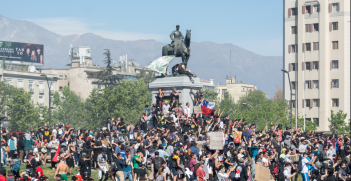Populism and the Political Economy of Bad Choices

Populism has become a loaded word, often hurled at anyone critical of the status quo, but it is hardly an illegitimate reaction. From a political economy perspective, it makes perfect sense.
If there was any doubt that Brexit populism in 2016 was going to be a unique and singular phenomenon, the election of Donald Trump in America months later in November made it clear that a new wave of populism was in fact sweeping across Western democracies. The euphoria and triumphalism of democracy-on-the-march that had reached its zenith in 2008 was clearly backsliding across Latin America, Asia, and in the liberal heartlands of the United States (US) and Europe.
Though Trump was booted from office in 2020 after a single term, both his political influence and his popular legacy has remained decidedly vibrant. From the far-right Brothers of Italy to the ultra-nationalist Sweden Democrats – and now Trump’s 2024 presidential bid – what explains populisms’ continued influence? And is there a useful role for it?
The origins of popular discontent
At their centre, populist claims are really responses to misunderstood economic phenomena dressed up in nationalistic righteousness. Their causes are varied. Demand-side economic explanations, for instance, contend that hyper-globalisation has sewn discontent among citizens due to falling social mobility and rising economic insecurity among the working and middle classes. Accordingly, this has been attributed to the sharp growth in economic intercourse, particularly between developed and developing countries, and the logistics revolution, which facilitated the offshoring of labour-intensive production processes.
In the West, many blue-collar workers saw their jobs disappear following the “China Shock” – the condition by which major manufacturing bases, under favourable legislative circumstances, were allowed to pack up and leave for cheaper (more exploitative) lands. This was especially pronounced in the US whereby the American economy lost 13 times as many manufacturing jobs between 2000 and 2010 than the period 1990 and 2000. The once upwardly mobile middle class were transformed by this modernisation and hollowed out at the same time by automation and financialization of traditionally labour intensive jobs.
The middle class across predominantly neoliberal-leaning Western countries observed their wages stagnate as unions were dismantled. Between 1977 to 2007, the income growth rate for the bottom 90 percent of Americans was less than 0.5 percent per year. Meanwhile, the richest one percent of Americans appropriated almost 60 percent of the total increase of US national income. Neoliberalism and its adherents had promised ubiquitous prosperity but delivered instead new heights in economic inequality as businesses and policymakers exploited deregulation in new and more open markets at the expense of social stability.
These economic trends have made many voters in the West resentful and thus susceptible to populist leaders who found a useful outlet in vilifying elites and the establishment in their countries. This materialized most plainly after the 2008 global financial crisis, which produced the largest spike in wealth inequality in post-war American history. This exaggerated experience of economic dislocation prompted many voters to validate populist narratives that the system was “rigged” and that the architects of unfettered capitalism were benefitting at their expense. Such festering maladies of the liberal international economy have acted as a catalyst for right-wing populist politics, which champions protectionism and nationalism to correct for voter disillusionment. In many ways, those such as Trump are not wrong in their prognostications about the liberal elite.
Sociocultural grievances
At the micro level, however, studies have found little correlation between individuals’ economic circumstances and populist voting behaviours. Rather, it is the individual’s fear that their future financial situation may worsen (due to foreign competition or automation) that ultimately makes them vulnerable to anti-establishment rhetoric. Such pathologies underscore deeper sociocultural grievances: as voters turn to blame the ruling elite that have disproportionately benefited within their countries, they have also sought to blame those perceived as economic “winners” from abroad.
While this has manifested in swelling support for protectionist policies, it has primarily resulted in the scapegoating of immigrants and asylum seekers as responsible for job and physical insecurity, and public services exhaustion. In Europe, for example, the refugee crisis of 2015, and high-profile Islamist terrorist attacks in Paris (2015) and Berlin (2016), aggravated latent xenophobic sentiments, such that migration and terrorism became seemingly synonymous in contemporary politics. COVID-19 has only exacerbated such attitudes, with the pandemic demonstrating the vulnerability of interdependence. That recent immigrants to the West typically come from non-western and non-Christian backgrounds has further sparked fears about the decline of Western values and identity, encouraging some voters to support populist candidates that promise to defend them, such as newly elected prime minister in Italy, Giorgia Meloni.
This perceived frontal assault on traditional values has been complemented by the mobilization of women and new minority groups within the work force, leading to many previously dominant working-class white males to feel socially marginalised in their own countries. Their “status anxiety” and failure to advance has thus created fertile ground for a counterculture driven by nativist, nationalist, and anti-system narratives – a posture aligned with right-wing populist parties.
Supply-side explanations
Supply-side populism offers a top-down perspective analysing how such structural trends are filtered through institutions. Specifically, such explanations ask why traditional political parties have become largely unresponsive to voters or at the very least insufficient in terms of their policy proposals – leading to the gradual erosion of trust in the establishment seen today.
One claim is that institutional prerogatives associated with the liberal international order are seen to be unnecessarily harmful to national interests, particularly in terms of national identity. This phenomenon was a key theme of the Brexit referendum, whereby British citizens felt their country had handed over its economic future to inaccessible and unaccountable EU technocrats in Brussels. A more salient development, however, was the strong anti-immigration sentiment harboured by “Leave” voters. Critically, this hostility was largely channelled toward the political establishment and the EU as the principal facilitators of ever-increasing porous borders via the Schengen Agreement. Voting ‘”Leave” was hence an opportunity to reassert British sovereignty and counteract the threat of immigration to job security. Once out, of course, the true implications of the leave position have only begun to surface. Regret is now widespread.
In the US, scholars have traced voter disenchantment – and indeed disenfranchisement – to the increasing role of dark money in politics and its pervasive ability to warp the agenda-setting process domestically. Such corporate lobbying has made voters feel powerless and voiceless within the mainstream political system so that many now feel only radical solutions can guarantee true representation of the people.
This has been confounded by a trend in the weakening of mainstream parties across the liberal democratic world, wherein the fragmentation of parties has necessitated the formation of Grand Coalitions to form government, such as in Israel, Germany, Spain, and France, among others. This convergence has blurred the differences and distinct policy solutions offered between mainstream centre-left and centre-right parties such that populist anti-establishment parties have come to be perceived as the only genuine panacea for society’s ills.
Ultimately, the rise of populism in the West is an expression of powerlessness. Many ordinary people feel as though they have lost control. The impassioned vote for populist candidates, seen from this angle, is a chance to restore that power to them. While the structures of globalisation may still be secure, the momentum against establishment politics shows little indication of abating.
Naylin Al is a Dean’s Honours List Bachelor of Arts student at the University of Melbourne, reading a double-major in Economics and Politics and International Studies. He is also a recipient of the Parliament of Victoria’s Presiding Officers’ Prize for the most outstanding Parliamentary Internship Report.
This article is published under a Creative Commons Licence and may be republished with attribution.





